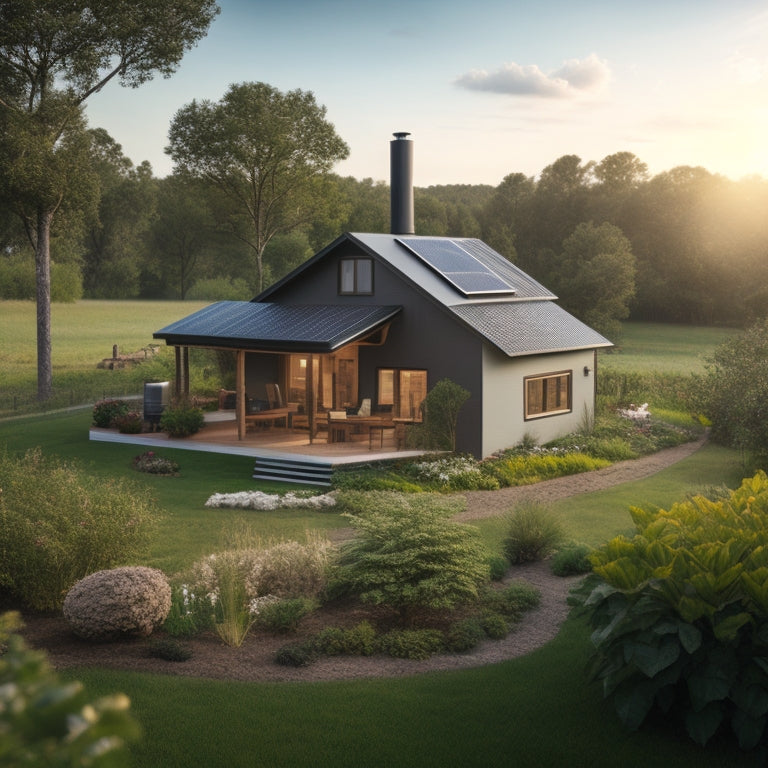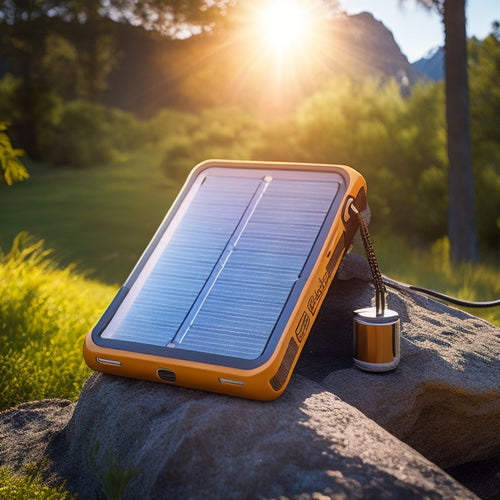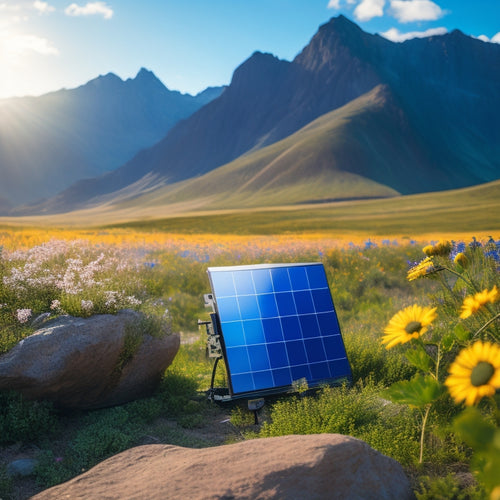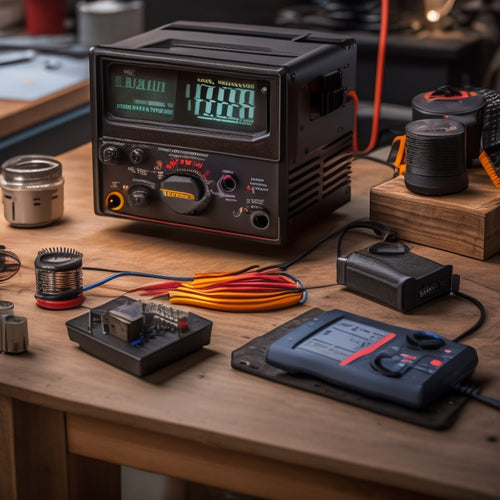
10 Ways to Take Your Home Off-Grid
Share
You can take your home off-grid by utilizing portable solar power, installing efficient energy storage systems, and reducing your home's energy consumption. Solar water heating solutions and off-grid water collection methods can also help you achieve energy independence. Moreover, energy-efficient appliance upgrades, insulation, and weatherization tips can minimize your reliance on public utilities. Additionally, biogas generation for homes and grid-free home lighting options can provide alternative energy sources. By implementing these methods, you'll be well on your way to living off-grid. As you investigate these options, you'll uncover even more ways to customize your path to energy independence.
Key Takeaways
- Utilize renewable energy solutions like solar power, wind energy, and biogas generation to reduce reliance on fossil fuels and lower energy bills.
- Implement efficient energy management systems, including energy storage and load balancing, to maximize renewable energy potential.
- Reduce home energy consumption by conducting energy audits, using energy-efficient appliances, and investing in smart home systems.
- Implement water management solutions like rainwater harvesting, greywater recycling, and natural filtration systems to conserve water and reduce waste.
- Improve home insulation and weatherization through proper insulation, sealing air leaks, and using eco-friendly materials to reduce energy loss and enhance comfort.
Harnessing Portable Solar Power
You can take the first step towards energy independence by utilizing portable solar power, a clean and renewable energy source that's becoming increasingly accessible.
This technology allows you to generate electricity anywhere, anytime, without relying on traditional power grids. By utilizing portable solar power, you can reduce your carbon footprint and operational costs by up to 90% cost-effective solution, making it an ideal option for those who want to minimize their impact on the environment.
Portable solar power systems typically consist of solar panels, solar charging stations, and portable battery packs. These components work together to convert sunlight into electrical energy, which can then be stored for later use.
With portable solar power, you can charge your devices, power small appliances, and even provide electricity for outdoor events or remote locations. By incorporating portable solar power into your daily life, you'll reduce your reliance on fossil fuels and take a significant step towards energy independence.
Efficient Energy Storage Systems
Energy storage systems are the backbone of off-grid living, and efficient energy storage is crucial for utilizing the full potential of renewable energy sources like solar power.
When selecting a system, take into account key evaluation factors such as capacity, depth of discharge, round-trip efficiency, upfront cost, warranty, lifespan, and unique features residential battery systems.
You'll want to take into account advanced battery technologies like lithium batteries, which offer high storage capacity and long lifetimes.
Your energy management system should work in tandem with solar inverters to optimize energy production and storage.
With a reliable backup system in place, you'll enjoy true grid independence.
Load balancing and energy monitoring features guarantee your system runs smoothly, even when the sun isn't shining.
Reducing Home Energy Consumption
With an efficient energy storage system in place, it's time to turn attention to the other side of the off-grid equation: reducing home energy consumption.
You'll want to start by conducting energy audits to identify areas of high energy usage. This will help you pinpoint opportunities for behavioral changes and lifestyle adjustments that can make a big impact.
To further reduce energy consumption, consider utilizing energy-efficient appliances, LED lighting, and proper insulation, as suggested in solar power system sizing.
Additionally, implementing low-wattage appliances, such as 12V refrigerators, can also decrease energy consumption.
Consider investing in a smart home system that allows for real-time energy monitoring and home automation. By tracking your peak usage times, you can make adjustments to your energy budgeting and take advantage of renewable incentives.
Solar Water Heating Solutions
You'll want to contemplate two primary system design options for your solar water heating solution: direct circulation systems, which heat water directly in the collector, and indirect systems, which use a heat exchanger to transfer heat to the water.
Both options offer significant energy efficiency gains, reducing your reliance on traditional energy sources.
System Design Options
System design plays an essential role in utilizing the sun's energy to heat your water. A well-planned system guarantees you get the most out of your solar water heating solution. To design an efficient system, you'll need to contemplate system components, load analysis, and energy budgeting. You may also want to investigate hybrid systems that integrate with other renewable energy sources.
| System Design Aspect | Description | Importance |
|---|---|---|
| Load Analysis | Determine your water heating demands | High |
| System Components | Select suitable collectors, tanks, and pumps | High |
| Maintenance Practices | Schedule regular checks and maintenance | Medium |
Additionally, contemplate system scalability, cost assessment, regulatory considerations, and safety measures to guarantee a reliable and efficient system. By carefully planning your system design, you'll be able to enjoy the benefits of solar water heating while minimizing costs and environmental impact.
Energy Efficiency Gains
Nearly 70% of your home's water heating energy can be offset by utilizing the sun's power, making solar water heating an attractive solution for environmentally conscious homeowners.
To maximize energy efficiency gains, consider conducting energy audits to identify areas of improvement. Installing smart thermostats and incorporating passive design principles can also reduce your energy consumption.
Take advantage of renewable incentives and green certifications to offset the costs of shifting to solar water heating. Additionally, make lifestyle adjustments, such as reducing hot water usage, to optimize energy management.
Combine these strategies with sustainable landscaping and energy monitoring to create an all-encompassing approach. By making these behavioral changes, you'll be well on your way to reducing your reliance on the grid and achieving a more sustainable lifestyle.
Off-Grid Water Collection Methods
Beyond relying on municipal water supplies, off-grid homes often employ innovative methods to collect and harvest water from various sources.
You can implement rainwater harvesting systems, which collect and store rainwater in storage tanks for later use.
Greywater recycling is another approach, where you reuse water from sinks, showers, and washing machines for irrigation and flushing toilets.
Natural filtration systems can be used to purify collected water, guaranteeing it's safe for consumption.
Water conservation is key, and implementing drip irrigation systems can greatly reduce water waste.
You can also consider DIY rain barrels, cistern installation, or alternative sources like atmospheric water, well drilling, or pond sourcing.
Effective water quality management is essential to make sure the water you collect is safe and healthy for your family.
DIY Solar Panel Installation
You'll need to select the right solar panels for your off-grid system, considering factors like efficiency, durability, and cost.
Next, you'll need to properly mount the panels to guarantee they're secure, waterproof, and angled for peak energy production.
Solar Panel Selection
When shifting to an off-grid home, selecting the right solar panels is essential for generating reliable and efficient energy.
You'll need to evaluate the type of solar panels that suit your needs. There are two main types: monocrystalline and polycrystalline. Monocrystalline panels are more efficient, with higher power output per hour of sunlight. Polycrystalline panels are less expensive but still provide decent energy output.
You'll also want to look at solar panel efficiency, which ranges from 15% to 22%. Higher efficiency means more power per hour of sunlight.
Assess your energy needs, climate, and budget to choose the right solar panels for your off-grid home.
Mounting and Wiring
With your solar panel selection complete, it's time to focus on the installation process.
You'll need to decide on a mounting technique that suits your roof type and local building codes. Common methods include roof-mounted, ground-mounted, and tracking systems. Make certain your chosen method is secure and watertight to prevent water damage and electrical issues.
When it comes to wiring, safety is paramount. Use UL-listed cables and connectors, and follow the National Electric Code (NEC) guidelines. Run wires through conduit or cable trays to protect them from environmental factors and physical damage.
Keep in mind local electrical codes and permits required for your installation. Proper mounting and wiring will guarantee a safe and efficient solar panel system.
Energy-Efficient Appliance Upgrades
Upgrading to energy-efficient appliances is an essential step in taking your home off-grid, as traditional appliances can account for a considerable portion of your energy consumption.
You'll want to replace old appliances with smart refrigerators, energy-saving dishwashers, and efficient washing machines. Consider induction cooktops, which heat food faster and use less energy.
Programmable thermostats and LED lighting upgrades will also reduce energy waste. Eco-friendly ovens and energy management systems can further optimize your energy usage.
Don't forget to upgrade to high-efficiency HVAC systems and install low-flow showerheads to minimize water consumption.
Insulation and Weatherization Tips
You'll likely be surprised by how much heat escapes through poorly insulated walls, floors, and ceilings.
When drafting insulation strategies, it's crucial to identify areas where heat loss occurs. Start by conducting an energy audit to pinpoint gaps and cracks.
Next, identify weatherization materials that suit your climate and budget. Consider using spray foam, fiberglass batts, or radiant barrier insulation for the best results.
Don't forget to seal gaps around windows, doors, and electrical outlets to prevent air leaks.
Properly insulating your home won't only reduce energy consumption but also increase comfort and reduce energy bills.
Biogas Generation for Homes
Biogas generation offers a viable alternative energy source for homes, leveraging organic waste to produce a renewable fuel. By installing biogas systems, you can convert organic waste into a significant energy resource. This approach not only reduces your reliance on fossil fuels but also helps minimize waste disposal costs.
Here are three key benefits of biogas generation for homes:
-
Renewable Energy Source: Biogas systems produce a clean-burning fuel that can power your home, reducing your carbon footprint and energy costs.
-
Waste Reduction: By utilizing organic waste, you'll minimize the amount of waste sent to landfills, reducing greenhouse gas emissions and environmental pollution.
-
Increased Energy Independence: With biogas generation, you'll have a reliable, on-site energy source, reducing your reliance on the grid and enhancing your energy independence.
Grid-Free Home Lighting Options
You're likely aware that lighting accounts for a significant portion of your home's energy consumption.
To reduce your reliance on the grid, you can investigate solar powered lighting options that utilize the sun's energy to power your lights.
Solar Powered Lighting
By day, the sun's rays illuminate your surroundings, but as the sun sets, you're left relying on traditional lighting sources.
However, you can utilize the sun's energy to power your lighting needs. Solar powered lighting is a reliable and eco-friendly alternative to traditional lighting sources.
Here are three benefits of switching to solar powered lighting:
-
Energy Independence: Solar powered lighting allows you to generate your own electricity, reducing your reliance on the grid.
-
Cost-Effective: Solar lanterns and outdoor solar fixtures require little to no maintenance, and their energy source is free.
-
Environmental Benefits: Solar powered lighting reduces your carbon footprint, making it an attractive option for environmentally conscious homeowners.
With solar powered lighting, you can enjoy the advantages of solar lanterns and outdoor solar fixtures while taking a significant step towards an off-grid lifestyle.
Energy Efficient Solutions
Grid-free home lighting options extend beyond solar power, offering a range of energy-efficient solutions to illuminate your off-grid abode.
You can investigate alternatives like wind energy, geothermal heating, or energy audits to optimize your energy consumption. Incorporating passive design principles into your home's design can also reduce the need for artificial lighting.
Consider investing in a smart home system that integrates with renewable resources to minimize your carbon footprint. By adopting sustainable practices and green building techniques, you'll not only conserve energy but also reduce your reliance on the grid.
Conduct an energy audit to identify areas for improvement and make data-driven decisions to optimize your energy conservation efforts.
Frequently Asked Questions
Can I Still Use My Existing Electrical Wiring With Off-Grid Systems?
Did you know 70% of US homes can accommodate solar panels? You'll likely need to upgrade your electrical panel to support solar panel integration and battery storage options, but you can still employ your existing wiring with some modifications and professional guidance.
How Do I Handle Waste Disposal in an Off-Grid Home?
You'll need to implement alternative waste disposal methods, such as composting toilets and greywater systems, which recycle water from sinks and showers, to efficiently manage waste and reduce your reliance on municipal sewage systems.
Are Off-Grid Homes More Prone to Pest Infestations?
As you settle into your secluded abode, surrounded by nature's serenity, you coincidentally notice unwelcome critters scurrying about; rest assured, you're not alone - off-grid homes can be prone to pest infestations, but effective pest prevention and natural remedies can keep them at bay.
Can I Still Have a Landline Phone in an Off-Grid Home?
You can still have a landline phone in an off-grid home, as long as you choose an off-grid technology that supports landline compatibility, such as satellite or cellular networks, which can connect your home phone to the public switched network.
How Do I Get Internet Access in a Remote Off-Grid Location?
You're traversing uncharted territory, like a ship finding its anchor in the dark, when seeking internet access in a remote off-grid location; consider satellite internet, which beams signals from space, or mobile hotspots, leveraging cellular networks for connectivity.
Related Posts
-

Fastest Solar Chargers for Emergency Power
When choosing the fastest solar chargers for emergency power, you need to focus on features like rapid charging capab...
-

High-Efficiency Solar Battery Chargers for Remote Areas
High-efficiency solar battery chargers are essential for your off-grid energy needs in remote areas. They maximize en...
-

Key Features of a DC to AC Converter
A DC to AC converter features high efficiency and conversion rates, which reduce energy costs and improve performance...


